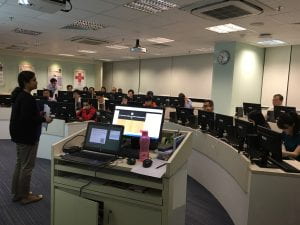Posted by Bella Ratmelia (Mar 13, 2015)
Caught at the tail end of Nobuko Miyairi‘s Academic Publishing Talk Series Lecture entitled “Evolving Research Tools in Scholarly Communication” : that’s GohCaught at the tail end of Nobuko Miyairi‘s Academic Publishing Talk Series Lecture entitled “Evolving Research Tools in Scholarly Communication” : that’s Goh Su Nee, Scholarly Communication Group Senior Assistant Director, in an apron presenting NTU Libraries Menus for Science 2.0 researchers. Click on the menu to see appetizer, main course and dessert details. Bon appetit!

Su Nee, Scholarly Communication Group Senior Assistant Director, in an apron presenting NTU Libraries Menus for Science 2.0 researchers. Click on the menu to see appetizer, main course and dessert details. Bon appetit!











NTU has achieved another milestone in its research data management and open access data sharing journey.
The NTU institutional open access research data repository, DR-NTU (Data) was launched by the NTU President Professor Bertil Andersson on 8 Nov 2017. In his speech, Professor Andersson noted that DR-NTU (Data) is the first one of its kind in Singapore. He encouraged NTU researchers to deposit, archive and share their final research data in DR-NTU (Data) in order to make their research data discoverable, accessible and reusable. As publicly funded research data are a public good, hence, it should be made openly available with as few restrictions as possible in a timely and responsible manner. He pointed out several benefits of open access data sharing. Firstly, it facilitates the opportunity to build on previous research results, thus resulting in improved quality of results. Secondly, it encourages collaboration and helps to avoid duplication of effort, thus resulting in greater efficiency. And thirdly, it helps to speed up innovation, which means faster progress to market means faster growth. Last but not least, it allows the involvement of citizens and society, hence improved transparency of the scientific process.
More than 240 NTU researchers and staff witnessed magical touches by Professor Andersson, Professor Schubert Foo, Deputy Associate Provost (Information & Knowledge) and Professor Michael Khor, Director, Research Support Office and Bibliometrics Analysis, President's Office on 3 touch lamps to kickstart the launch ceremony.
After that, Ms Goh Su Nee, Deputy Director, Office of Information, Knowledge & Library Services (OIKLS) shared about the benefits of using DR-NTU (Data), how research data is organised in the repository and OIKLS data curation services. These services include advice, review and training on metadata, file organisation, data documentation, terms of use open formats and open access. There was a poster exhibition during the tea reception. Click on the thumbnails to view the posters.
Ms Chew Shu Wen, Assistant Director, OIKLS wrapped up the event by giving a demonstration on how to get started and how to upload and describe data files. Click here to view the slides.
Videoclips:
Click here to view the DR-NTU (Data) launch video.
If you wish to deposit your data in DR-NTU (Data), or have further questions please contact us at library@ntu.edu.sg.
Commenting on blog posts requires an account.
Login is required to interact with this comment. Please and try again.
If you do not have an account, Register Now.